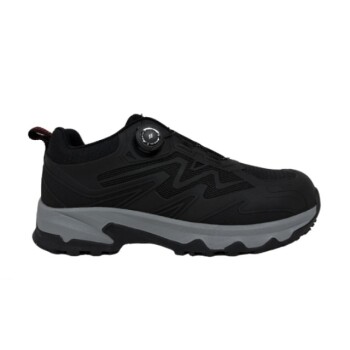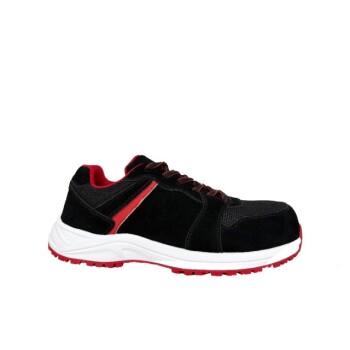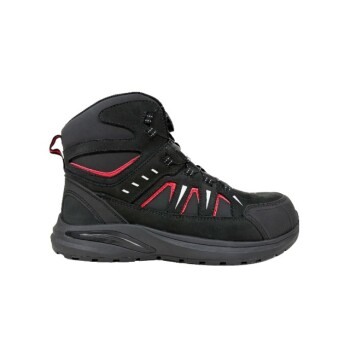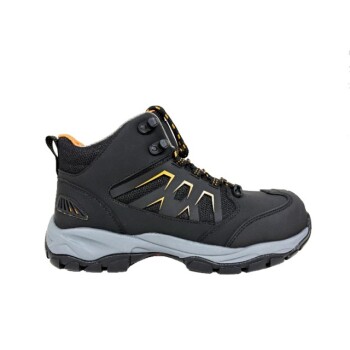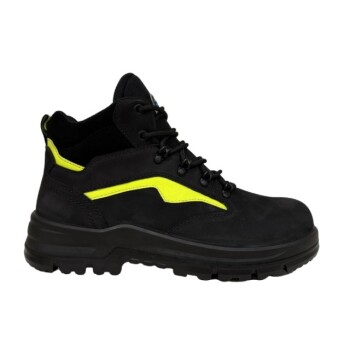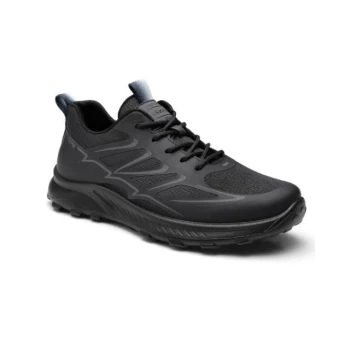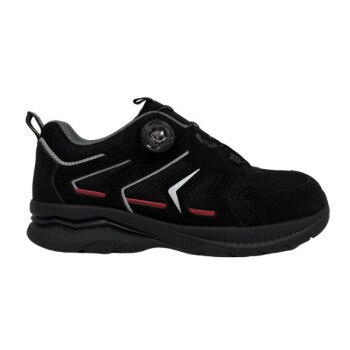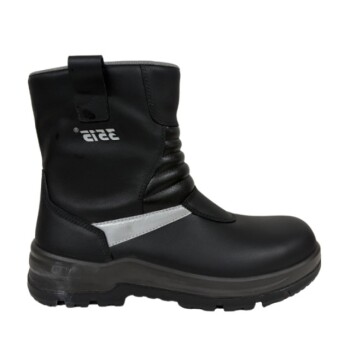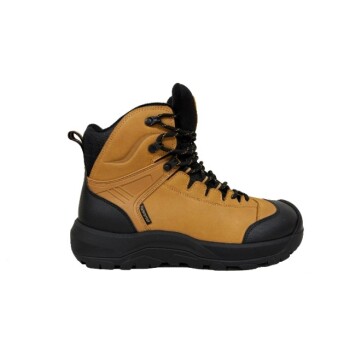A landmark study in the Scandinavian Journal of Work, Environment, and Health confirmed that providing appropriate slip-resistant footwear is a highly effective safety intervention. The research, which focused on food service workers, found that equipping employees with highly-rated, slip-resistant shoes led to a 67% reduction in workers' compensation claims for slip-related injuries.
The core takeaway is not just that these shoes work, but that their effectiveness is a direct result of matching the right footwear technology to a specific environmental hazard. The 67% reduction in injuries highlights a clear, data-backed solution to one of the most common workplace accidents.
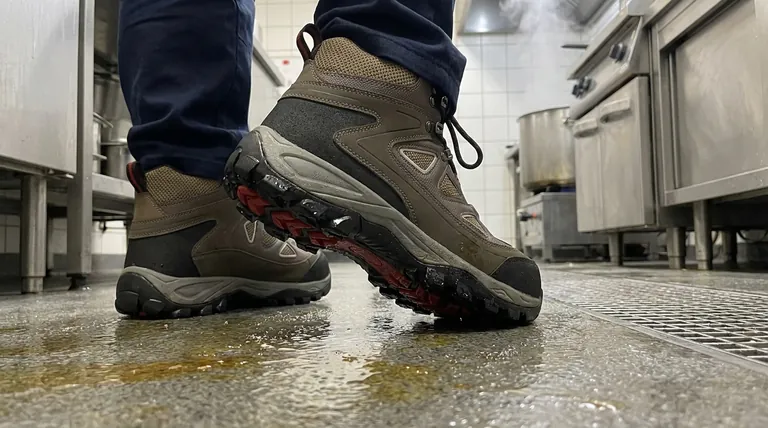
How Slip-Resistant Shoes Actually Work
Understanding the mechanics of slip resistance is key to appreciating why certain shoes succeed while others fail. The technology is based on maximizing a single physical principle: friction.
The Principle of Friction
Friction is the force that resists the relative motion between two surfaces in contact. A slip-resistant shoe is engineered to maximize this force against a variety of floor surfaces.
The Role of Sole Material
The foundation of a slip-resistant shoe is its rubber sole. The specific compound of rubber used is soft enough to create a strong grip, conforming to the microscopic texture of the floor to increase surface contact and resistance.
The Importance of Tread Design
The pattern of grooves, or treads, on the sole is the most critical design element. These deep channels are not random; they are engineered to siphon liquids like water, grease, and oil away from the bottom of the shoe, allowing the solid parts of the sole to make direct contact with the floor.
Why a "One-Size-Fits-All" Approach Fails
The study's focus on a specific industry—food service—is important. A shoe that excels on a greasy kitchen floor may not be the optimal choice for an icy construction site. A true safety assessment requires a nuanced approach.
Assessing the Surface Conditions
The primary consideration is the floor itself. Are your teams working on consistently wet floors, oily surfaces, or uneven and unpredictable terrain? Each condition demands a different tread design and material composition.
Accounting for Job-Specific Demands
The daily tasks of an employee dictate the type of footwear needed. A kitchen worker who stands on a tiled floor requires a different sole design than a construction worker navigating mud, rebar, and loose gravel.
Considering Climate and Environment
For roles that involve outdoor work, climate is a major factor. The impact of rain, snow, or ice on a shoe's grip cannot be overstated, and footwear must be selected specifically for these hazards.
Common Pitfalls to Avoid
Implementing a footwear program is more than just purchasing shoes; it requires avoiding common oversights that can undermine the investment in safety.
Not All "Slip-Resistant" Labels Are Equal
The study specified highly-rated shoes for a reason. Many shoes are marketed as "slip-resistant" without meeting rigorous industry standards. Always look for specific ratings or certifications to verify performance claims.
Ignoring Wear and Tear
The effectiveness of a shoe's tread diminishes over time as the rubber wears down. An effective safety program must include regular inspection of footwear and clear guidelines for when shoes must be replaced.
Focusing Only on the Shoe
Even the best footwear cannot prevent all slips on a poorly maintained surface. Slip-resistant shoes are one component of a larger safety system that must also include diligent cleaning protocols and proper floor maintenance.
Making the Right Choice for Your Environment
To effectively implement a slip-prevention program, you must align your footwear choice with your specific workplace hazards.
- If your primary focus is a food service or hospitality setting: Prioritize shoes with softer rubber soles and intricate tread patterns designed to channel away viscous liquids like grease and oil on smooth surfaces.
- If your primary focus is an outdoor or construction environment: Select rugged footwear with deep, widely spaced treads capable of providing stability on uneven terrain and shedding mud, snow, or water.
- If your primary focus is a general industrial or warehouse setting: Choose a durable shoe with a balanced tread design, ensuring its specific slip-resistance rating is certified for the most common floor surfaces and potential contaminants in your facility.
Investing in the correct, highly-rated slip-resistant footwear is a proven and quantifiable measure to protect your team and your operations.
Summary Table:
| Study Finding | Key Implication |
|---|---|
| 67% reduction in slip injury claims | Highly-rated slip-resistant footwear is a proven, effective safety intervention. |
| Focus on food service workers | Effectiveness depends on matching shoe technology to specific environmental hazards. |
| Importance of 'highly-rated' shoes | Not all 'slip-resistant' labels are equal; certifications and ratings matter. |
Protect your team with data-backed safety solutions. The study confirms that the right footwear drastically reduces workplace injuries. As a large-scale manufacturer, 3515 produces a comprehensive range of certified safety footwear for distributors, brand owners, and bulk clients. Our production capabilities encompass all types of slip-resistant shoes and boots engineered for specific hazards—from greasy kitchens to rugged construction sites.
Contact 3515 today for a consultation. Let our experts help you select the optimal, highly-rated footwear to safeguard your employees and reduce compensation claims.
Visual Guide
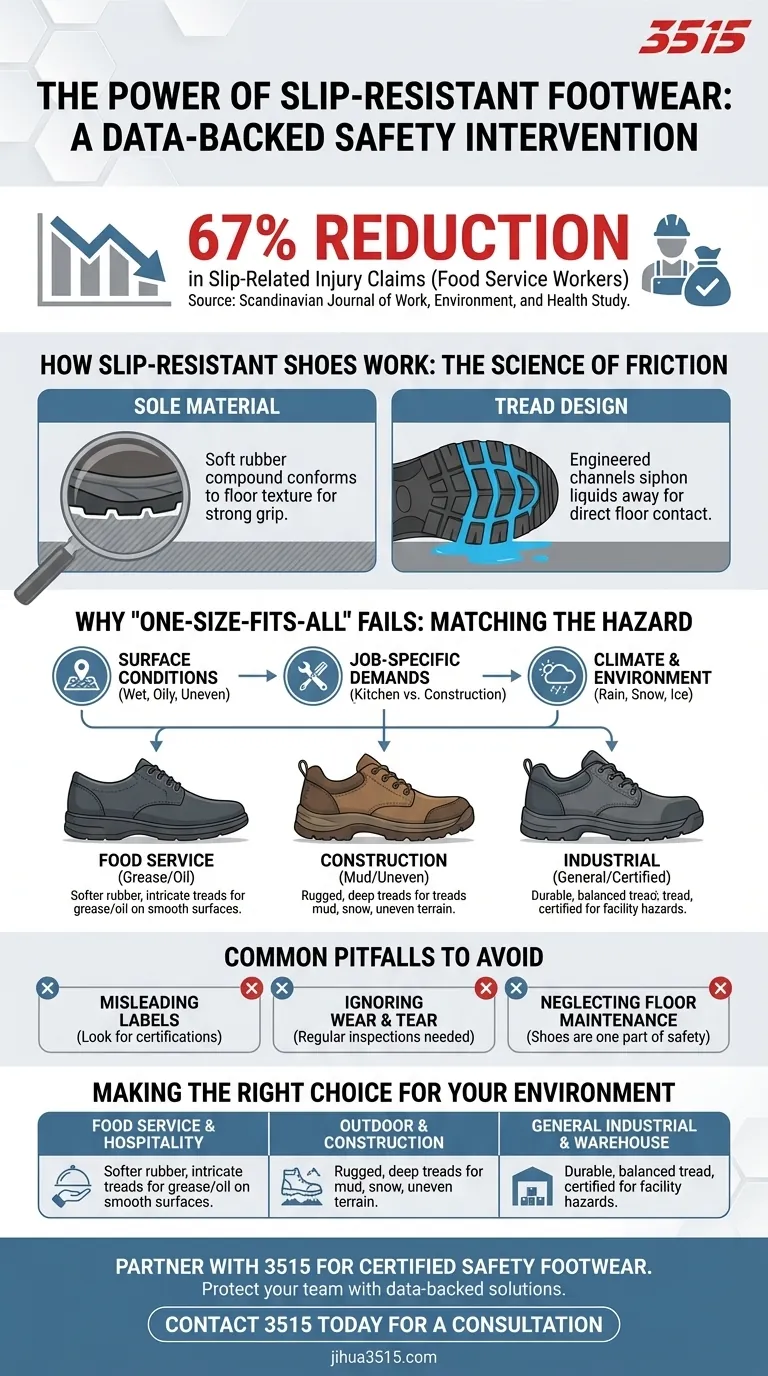
Related Products
- Safety Footwear Wholesale Manufacturer for Custom OEM/ODM Production
- Advanced KPU Athletic Safety Shoe with Steel Toe Cap Anti-Slip Rotary Lacing System
- Premium Suede Sport Safety Shoes for Wholesale & Bulk Orders
- Heavy Duty Nubuck Safety Boots Safety Shoes for Global Distribution
- Premium Sport Style Safety Boots for Bulk Orders
People Also Ask
- How do safety shoes contribute to cost savings for companies? A Strategic Investment in Risk and Cost Management
- Are employers required to provide steel-toe rubber boots at no cost to employees? Yes, under OSHA rules.
- What are the differences between steel toe, composite toe, and alloy toe Wellington boots? Choose the Right Safety Toe for Your Job
- Can heavy duty work boots be worn daily outside of work? Discover Durable, All-Day Comfort
- What type of footwear is required in meatpacking and poultry plants due to slippery conditions? Essential Safety Boots for Slippery Floors

